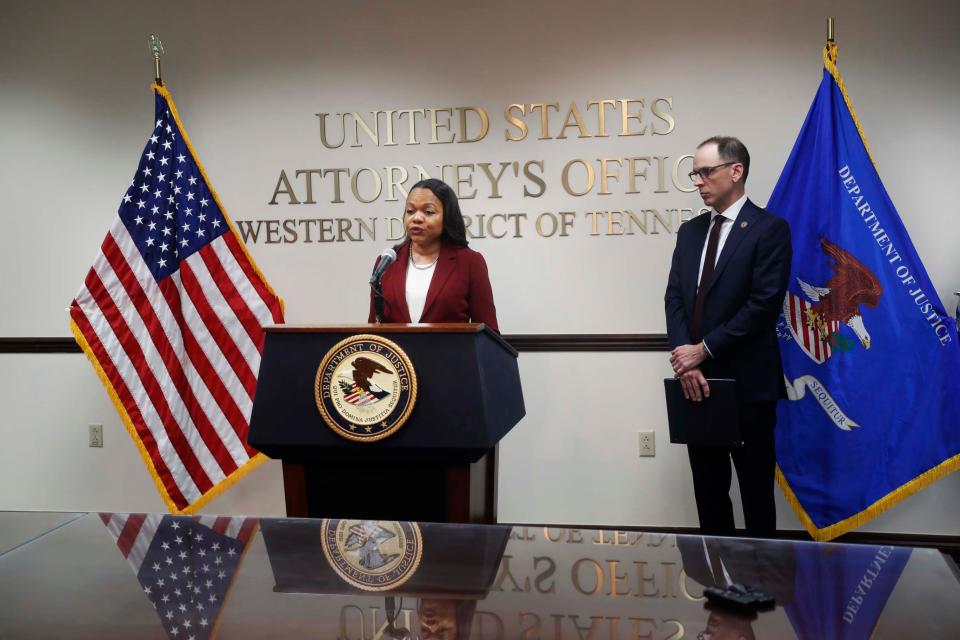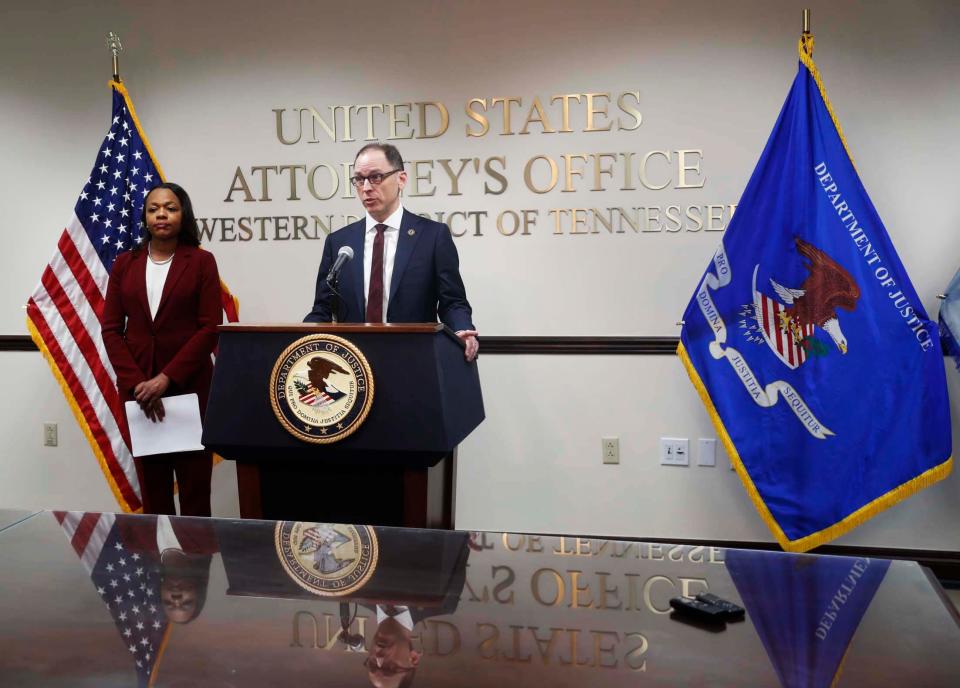Who polices the police? Federal probe in Memphis marks latest effort to reform law enforcement
The list of U.S. big-city police departments under federal scrutiny seems to keep growing: Chicago. Minneapolis. Louisville. Seattle and Phoenix.
Now comes Memphis, where the Department of Justice announced Thursday a civil rights investigation into the city and its police force over alleged systemic use of excessive force and discrimination. The probe comes seven months after the beating death of Tyre Nichols by Memphis Police officers following a traffic stop, in a case that sparked national outcry and calls for police reform.
Laurie Levenson, a professor at Loyola Law School in Los Angeles and former federal prosecutor, said an outside investigation and subsequent consent decree are critical for auditing police departments and enforcing change.
“The police cannot police themselves,” Levenson said.
Chuck Wexler, executive director of the Police Executive Research Forum, a Washington-based police research group, said a DOJ investigation is "not something they take lightly." DOJ opens between 10 to 20 such cases annually among 18,000 police departments nationwide.
"It's a major step, no question," Wexler said. "The DOJ wants to take a look and see if Memphis' practices, such as Tyre Nichols, is an isolated case or part of a broader series of patterns."
DOJ probes US police departments over racism, violence
With Memphis, the DOJ now has open investigations into seven law enforcement agencies, including the Louisiana State Police, the New York City Police Department’s Special Victims Divisions and police departments in Phoenix; Mount Vernon, New York; Worcester, Massachusetts; and Oklahoma City.
The Justice Department has recently completed high-profile investigations in Louisville and Minneapolis, following the fatal shooting of Breonna Taylor and the murder of George Floyd, respectively. The DOJ is now negotiating consent decrees in those two cities to address the problems found from the investigations.

A consent decree is a federal court order. If a DOJ investigation finds problems in a law enforcement agency, it will enter into a legal agreement with that agency to essentially take over and enforce protocol for change. The decree could include updating current policies or creating new ones, revamping police training and establishing systems of accountability and transparency, according to the Baltimore Police.
What to know: Memphis is facing a federal civil rights investigation
Under the 1994 Violent Crime Control and Law Enforcement Act, the Justice Department's civil rights division has the power to investigate systemic police misconduct.
The DOJ might launch an investigation for numerous reasons, including a community complaint, a high-profile case of police misconduct, or media scrutiny, according to Christy E. Lopez, a law professor at Georgetown University in Washington, D.C., who led the Justice Department's investigations in Ferguson, Missouri; Chicago and other cities.
If the DOJ finds a pattern of misconduct, it negotiates an agreement for reform — typically a consent decree overseen by a federal court and an independent monitor, said Danny Murphy, a police reform consultant and a former Baltimore police deputy commissioner.
'Not a perfect solution'
The investigation in Memphis could take up to a year and could result in a consent decree that would force many changes on a department that has long faced tension between its officers and the community, experts said. Still, sweeping and long-term reforms are expected to remain a challenge.
"I'm actually surprised it took so long for this type of investigation to take place there," said Michael Alcazar, a retired New York Police Department detective and adjunct lecturer at the John Jay College of Criminal Justice in New York City. "It seems like there may be a lot of wrongdoing in Memphis and they don't have enough checks and balances in place."
Consent decrees can last up to a decade, or even longer, said Levenson, of Loyola. While an effective tool, Levenson said an agency can relapse after a consent decree is resolved because of systemic issues.

“These problems are so entrenched,” she said. “It’s not a perfect solution, but it’s probably the best tool we have.”
In Ferguson, which became an epicenter for police reform after mass protests following the fatal police shooting of Michael Brown in 2014, there were major changes eight years later.
Ferguson monitor Natashia Tidwell reportedly cited significant progress in officer training and community policing. The mostly all-white police department is more racially diverse. Traffic stops are less frequent and systems have been set up to hear resident complaints.
In Detroit, the police department rose from a consent decree in 2016 after 13 years under federal oversight. Changes included fewer officer-involved shootings, department-wide audits and "intensive inspections of police practices from the precinct to the command levels," according to court documents.
Use of force expert says Memphis police unit 'running wild'
Memphis police needs oversight, said Timothy Williams, a police use-of-force expert who served with the Los Angeles Police Department when it was under a consent decree from 2001 to 2013.
Williams said a probe into Memphis is sorely needed based on its high number of arrests from minor traffic stops and officers’ actions in the so-called SCORPION unit, which was billed as a violent crime-fighting unit. The five officers who have been charged with murder in Nichols' death were all part of that elite unit.
“The arrests tell you there is no constitutional policing going on,” Williams said. “Their unit is running wild.”
Williams said federal monitoring of the LAPD led to better oversight and a tighter chain of command. A 2021 USA TODAY/Suffolk University Poll of Los Angeles residents, however, found the LAPD still uses force when it's not necessary, and a third of those surveyed call the department largely racist.
For lasting change, Williams said Memphis will have to reevaluate its leadership as well as the officers it hires.
“If you want to change systemic issues," Williams said. "You’ve got to change what comes into the organizations."
Memphis officials reaction
Memphis Mayor Jim Strickland promised the department would be transparent and cooperative during the investigation, but said the lack of discussion "disappointed" him.
"Just as we have been transparent and cooperative with the Department of Justice CRITAC Independent Review, the city will be a good partner in this new inquiry," Strickland said in a statement. "However, I am disappointed that my request was not granted by the Department of Justice to discuss this step before a decision was made to move down this path. I know they discussed the need for such an action with many other individuals. I hope the remainder of the process is more forthright and inclusive than it has been so far."
Memphis Police Chief Cerelyn "C.J." Davis condemned the actions of the officers that have been charged with the beating of Nichols, but voiced support for officers who follow MPD policies and practices.
Notable Civil Rights Attorney Ben Crump, who is representing Nichols' parents Rodney and RowVaughn Wells in a $550 million civil case against the City of Memphis, said Nichols' family is grateful about the investigation being announced, saying he hopes the investigation will "provide a transparent account of the abuses of power we have seen" in Memphis.
"The family of Tyre Nichols is grateful that the Department of Justice heard their cries for accountability and are opening this investigation. Actions such as this will continue to show that the federal government will not let corruption within police departments take the lives of innocent Americans. It is our hope that the investigation by the DOJ, under the leadership of Attorney General Garland and Assistant Attorney General Clarke, will provide a transparent account of the abuses of power we have seen and continue to see in Memphis."
"The Memphis Police Department will continue to fully cooperate and work closely with the Department of Justice as its members conduct this next phase of their investigation," Davis said in a statement. "As we have said all along, all MPD officers are expected to act in accordance with their oath of office, their training and department policies at all times. While the officers involved in the Tyre Nichols case demonstrated no regard for these tenets, I am appreciative of the MPD officers that continue to serve our city with integrity. As chief of police, I am committed to building and maintaining public trust with the citizens of Memphis that we took an oath to serve each and every day."
Memphis Commercial Appeal reporters Katherine Burgess and Lucas Finton contributed to this article.
This article originally appeared on Nashville Tennessean: Memphis police is the latest department being investigated by DOJ

